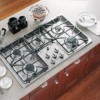GE JGP975SEKSS Use and Care Manual - Page 8
Safety Instructions, Care and Cleaning, Troubleshooting Tips, Consumer Support
 |
UPC - 084691114529
View all GE JGP975SEKSS manuals
Add to My Manuals
Save this manual to your list of manuals |
Page 8 highlights
Consumer Support Troubleshooting Tips Care and Cleaning Operating Instructions Safety Instructions Using the cooktop burners. How to Select Flame Size For safe handling of cookware, never let the flames extend up the sides of the cookware. Watch the flame, not the knob, as you reduce heat. The flame size on a gas burner should match the cookware you are using. Any flame larger than the bottom of the cookware is wasted and only serves to heat the handle. Use a flat-bottomed wok. Wok This Way We recommend that you use a 14-inch or smaller flat-bottomed wok. They are available at your local retail store. Only a flat-bottomed wok should be used. Make sure the wok bottom sits flat on the grate. Do not use a wok support ring. Placing the ring over the burner or grate may cause the burner to work improperly, resulting in carbon monoxide levels above allowable standards. This could be dangerous to your health. Cookware Aluminum: Medium-weight cookware is recommended because it heats quickly and evenly. Most foods brown evenly in aluminum cookware. Use saucepans with tight-fitting lids when cooking with minimum amounts of water. Enamelware: Under some conditions, the enamel of some cookware may melt. Follow cookware manufacturer's recommendations for cooking methods. Glass: There are two types of glass cookware: those for oven use only and those for cooktop cooking (saucepans, coffee and tea pots). Glass conducts heat very slowly. Cast Iron: If heated slowly, most cookware will give satisfactory results. Heatproof Glass-Ceramic: Can be used for either surface or oven cooking. It conducts heat very slowly and cools very slowly. Check cookware manufacturer's directions to be sure it can be used on a gas cooktop. Stainless Steel: This metal alone has poor heating properties and is usually combined with copper, aluminum or other metals for improved heat distribution. Combination metal cookware usually works satisfactorily if it is used with medium heat as the manufacturer recommends. Home Canning Tips Be sure the canner is centered over the burner. To prevent burns from steam or heat, use caution when canning. Use recipes and procedures from reputable sources. These are available from manufacturers such as Ball® and Kerr® and the Department of Agriculture Extension Service. 8















